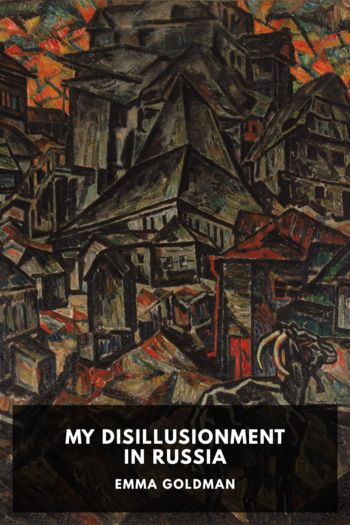Journey from St. Petersburg to Moscow Irina Reyfman (snow like ashes .TXT) 📖

- Author: Irina Reyfman
Book online «Journey from St. Petersburg to Moscow Irina Reyfman (snow like ashes .TXT) 📖». Author Irina Reyfman
The press, before the revolution of 1789 that took place in France, was nowhere so constrained as in this state. A hundred-eyed Argos, a hundred-handed Briareus, the police of Paris raged against writings and writers. In the dungeons of the Bastille wasted away the unfortunate who had the audacity to denounce the greed and depravity of ministers. Had the French language not enjoyed such universal use in Europe, France, which suffered under the lash of censorship, would not have attained that grandeur of thought to which so large a number of its writers offers proof. But the widespread use of French gave a reason to establish presses in Holland, England, Switzerland, and in the German lands, and everything you could not dare to be published in France was published freely in other places. So in this way power, flaunting its muscles, was derided and was not frightful; so it was that the maws foaming with fury remained empty, and firm speech slipped out of them unscathed.
How not to marvel at the incongruity of the human mind! Now when in France all are breathless about liberty, when brazenness and anarchy have reached the limit of possibility, censorship in France has not been abolished. And while everything can be published there now with impunity, it is clandestine. Not long ago we read—and may the French weep for their fate and with them all of humanity—we read not long ago that the Assemblée Nationale, acting as autocratically as the monarch had done hitherto, seized by force a book and put its author on trial for having dared to write against the Assemblée Nationale. Lafayette was the perpetrator of the sentence. O France! You continue to skirt the abyss of the Bastille.
With their equipment hidden from the authorities, the proliferation of printing presses in the German lands deprives them of the capacity to rage against reason and enlightenment. The smaller German governments, even though they are trying to impose a limit on freedom to publish, have been unsuccessful. Even though Wekhrlin was put under arrest by a vengeful government, the Gray Monstrosity remained in everyone’s hands.106 The late Frederick II, the Prussian king, in his lands all but established freedom to print: he did it not through the promulgation of any legislation, but only by tacit permission and the example of his own ideas. Why be surprised that he did not abolish censorship? He was an absolute monarch whose cherished passion was omnipotence. Contain your laughter.—He learned that someone was planning to assemble and publish his decrees. He assigned to them two censors—or perhaps it would be more appropriate to say inspectors. O domination! O omnipotence! you do not trust your own physical strength! You fear the accusation you make of yourself, you fear lest your tongue betray you and lest your own hand box your ears!—But what good could they do, these tyrannical censors? Far from doing good, they only could do harm. They secreted from the scrutiny of posterity some absurd law that power was ashamed to submit to future judgment, a law that once published could be a bridle on power so that it dares not to realize monstrous deeds. The Emperor Joseph II107 removed in part an obstacle that barred the path to enlightenment and oppressed reason in the Austrian lands during the reign of Maria Theresa. But he was unable to shake off the burden of prejudices and published a very long memorandum on censorship. If he can be praised for not having banned criticism of his decisions, any complaint about his behavior, and the like, from being published in the press, still we will reproach him for leaving this curb on the freedom of expression of ideas. How easy it is to use this for bad ends! …* Why feel any surprise? We say now what we said earlier: he was an emperor. Tell me, then, where can there be more incongruities than in a royal head?
In Russia…. What happened in Russia with censorship you will learn another time. And now, without imposing censorship on the postal horses, I set off on my journey in haste.
* It is said that a censor of this kind did not give permission to print compositions in which God was mentioned, saying “I have nothing to do with Him.” If in any sort of composition the customs of the people of one or another state were faulted he considered this to be unacceptable, saying that Russia had a friendship treaty with them. If there was a mention in a work of a prince or count he did not allow





Comments (0)